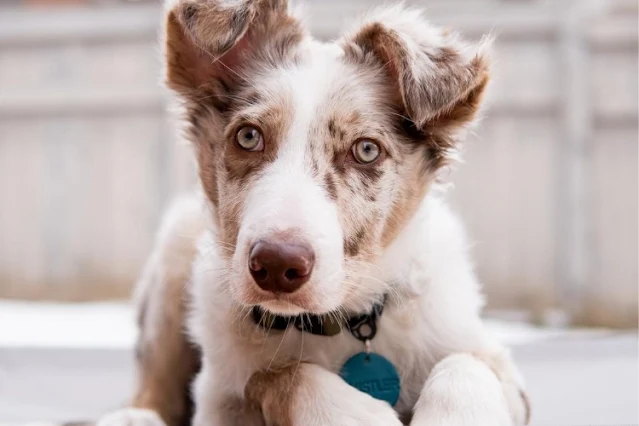When can I start training my puppy?
There are different opinions on this matter. Many owners believe that before one year of age, puppies do not learn because they only want to play. Others think the opposite: if you don't train them before they are one year old, you won't be able to do anything because their personality has already been formed. But there is a third belief: there is no need to train puppies because, after one year of age, they calm down on their own.
Beyond popular opinions and beliefs, there is the knowledge of the experts. Professional dog handlers may also have different opinions among themselves, but their judgment is usually based on experience.
The difference of opinion is largely due to the fact that, quite simply, each breed of dog has its own stages of development and each particular animal has its own character, capabilities, and personality.
Dedicating time and effort to the training of a puppy is an investment for the future: it will avoid behavioral problems in the long run and will improve the well-being of the animal and the whole family.
There is no single ideal age for training all types of dogs. However, we can look at some general issues to get an idea of when to start training our pet.
Therefore, specialists do not usually talk about a specific age for training dogs. What is done, instead, is to try to understand the different ages and their particularities in order to face each stage of education at the right time.
When we are clear about when to start training, we must decide how we are going to approach the process. The most appropriate thing to do is to follow positive training, that is to say, to avoid punishment. If in doubt, it is best to consult an experienced trainer.
What are the different stages of puppy training?
As we have already said, each breed of dog has its own stages and each animal develops differently. While some reach maturity at six months, others do not do so until they are twelve months old. However, we can establish some general stages to get an idea of how puppies usually grow.
The puppy's first days of life
In the first days of life, puppies sleep most of the time. When they are awake, all they do is suckle.
At about thirteen days, they begin to open their eyes. The ears show the first signs of activation after twenty days (e.g., they start to startle at noises).
At this stage, they need to be with their mother and rest to develop properly.
Read also: When Do Puppies Start To Walk?
The socialization phase begins at three to four weeks of age. At this age, the little ones only want to play with their siblings. This play helps them to understand the organization of the herd (the stronger ones win over the weaker ones) and to explore the environment. Little by little, the mother weans them, and they gain autonomy.
This is the most receptive period of puppies' lives: they begin to perceive and interpret external stimuli and can explore the environment without fear. This process is known as imprinting.
At six to ten weeks, puppies may already be adopted and separated from the pack. At this age, they learn to accept other people and other dogs without showing aggression or fear. They also adapt better to new environments.
At around three months of age, puppies usually complete their socialization phase and enter the juvenile stage. At this stage in their social development, they are able to engage in hunting and exploratory activities.
Many dogs reach sexual maturity at six months. Others, as previously said, do not reach sexual maturity until they are twelve months old.
At this stage, the dogs already have a certain emotional stability. It is the ideal time to get them used to the new home and the rules of coexistence.
Between six and eight months of age, you can start training dogs. Thanks to their maturity, we can achieve good discipline at this age.
Their interest in the game is an important asset: motivation helps them follow the guidelines we set for them. If the dog already has a bad habit, it can still be easily corrected.
When dogs are one and a half or two years old, they can still learn in a simple and effective way the rules we teach them.
Dogs over two years of age are fully mature animals with established habits and a complete personality. Training these dogs is possible, but requires much more effort and dedication.
There are people who decide to give older dogs from the pound a second chance. This shows a lot of compassion and commitment. Some of these animals have not received proper care and have behavioral problems.
Training an older dog is possible, but usually requires the intervention of a specialist. Forcing these animals or subjecting them to rigorous training and extensive training sessions is not recommended.
The training of a dog can consist of different processes: socialization within the pack, learning the rules of coexistence, correction of bad habits, modification of undesired behaviors, even sports training. As we have seen, each step has its appropriate moment.
Incorrect socialization can lead to fear, aggression, or disruptive behavior. Therefore, it is important not to separate puppies from their mothers too quickly.
Once in the new home, the puppy must first learn the basic rules of coexistence: sleeping, eating, walking schedules, etc. This step must be taken calmly, little by little.
It is not advisable to implement intensive training before the age of six months. Although dogs are capable of learning to comply with commands at a younger age, the pressure would not be proportional to their maturity. However, they can be trained earlier to perform dog activities as long as they are motivated and see the process as a game.
In short, each step of the process has its ideal age. The most intense training should be left to dogs older than six months. However, older dogs can be trained without any problems. In any case, it is always best to consult an expert in dog training.
Between the third and seventh week
The socialization phase begins at three to four weeks of age. At this age, the little ones only want to play with their siblings. This play helps them to understand the organization of the herd (the stronger ones win over the weaker ones) and to explore the environment. Little by little, the mother weans them, and they gain autonomy.
This is the most receptive period of puppies' lives: they begin to perceive and interpret external stimuli and can explore the environment without fear. This process is known as imprinting.
At six to ten weeks, puppies may already be adopted and separated from the pack. At this age, they learn to accept other people and other dogs without showing aggression or fear. They also adapt better to new environments.
Three months of age
At around three months of age, puppies usually complete their socialization phase and enter the juvenile stage. At this stage in their social development, they are able to engage in hunting and exploratory activities.
Six months of age
Many dogs reach sexual maturity at six months. Others, as previously said, do not reach sexual maturity until they are twelve months old.
At this stage, the dogs already have a certain emotional stability. It is the ideal time to get them used to the new home and the rules of coexistence.
Between six and eight months
Between six and eight months of age, you can start training dogs. Thanks to their maturity, we can achieve good discipline at this age.
Their interest in the game is an important asset: motivation helps them follow the guidelines we set for them. If the dog already has a bad habit, it can still be easily corrected.
Between one and a half and two years
When dogs are one and a half or two years old, they can still learn in a simple and effective way the rules we teach them.
More than two years old
Dogs over two years of age are fully mature animals with established habits and a complete personality. Training these dogs is possible, but requires much more effort and dedication.
Older dogs
There are people who decide to give older dogs from the pound a second chance. This shows a lot of compassion and commitment. Some of these animals have not received proper care and have behavioral problems.
Training an older dog is possible, but usually requires the intervention of a specialist. Forcing these animals or subjecting them to rigorous training and extensive training sessions is not recommended.
The best age to start training a dog, according to the experts
The training of a dog can consist of different processes: socialization within the pack, learning the rules of coexistence, correction of bad habits, modification of undesired behaviors, even sports training. As we have seen, each step has its appropriate moment.
Incorrect socialization can lead to fear, aggression, or disruptive behavior. Therefore, it is important not to separate puppies from their mothers too quickly.
Once in the new home, the puppy must first learn the basic rules of coexistence: sleeping, eating, walking schedules, etc. This step must be taken calmly, little by little.
Learning sessions need to be short and motivating (with lots of play), so be patient and empathetic!
It is not advisable to implement intensive training before the age of six months. Although dogs are capable of learning to comply with commands at a younger age, the pressure would not be proportional to their maturity. However, they can be trained earlier to perform dog activities as long as they are motivated and see the process as a game.
In short, each step of the process has its ideal age. The most intense training should be left to dogs older than six months. However, older dogs can be trained without any problems. In any case, it is always best to consult an expert in dog training.


